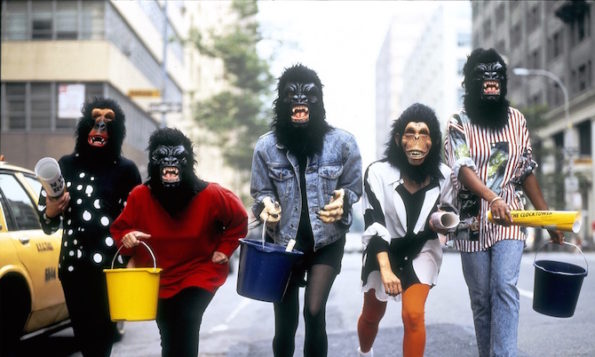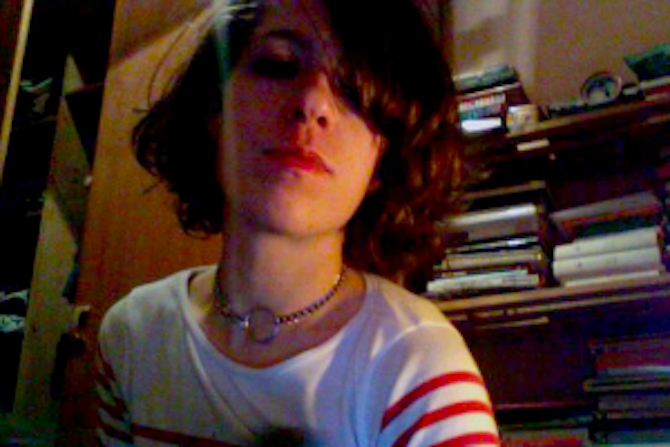Search
To search for an exact match, type the word or phrase you want in quotation marks.
A*DESK has been offering since 2002 contents about criticism and contemporary art. A*DESK has become consolidated thanks to all those who have believed in the project, all those who have followed us, debating, participating and collaborating. Many people have collaborated with A*DESK, and continue to do so. Their efforts, knowledge and belief in the project are what make it grow internationally. At A*DESK we have also generated work for over one hundred professionals in culture, from small collaborations with reviews and classes, to more prolonged and intense collaborations.
At A*DESK we believe in the need for free and universal access to culture and knowledge. We want to carry on being independent, remaining open to more ideas and opinions. If you believe in A*DESK, we need your backing to be able to continue. You can now participate in the project by supporting it. You can choose how much you want to contribute to the project.
You can decide how much you want to bring to the project.

I don’t have a topic for this text. It ought to be about artistic research, but the point is I also don’t have a topic for artistic research. Audre Lorde said something like there is no such thing as a single-issue struggle because we don’t live single-issue lives. In English the phrase functions better because it uses the word issue that can mean a subject or a problem. And here is what begins to be interesting about research, when problems arise, conflicts generated by differences. Like homologation and normality, we already know they end badly with many things falling by the wayside; solutions to problems ought to be discursive and creative, and not erase difference.
Virginie Despentes begins King Kong Theory: like this: “I am writing as an ugly one for the ugly ones, the old hags, the dykes, the frigid, the unfucked, the unfuckables, the neurotics, the pyschos, for all those girls that don’t get a look-in in the universal market of the consumable chick. I’m making excuses no excuses for myself. I’m not complaining. I would never swap places, because it seems to me that being Virginie Despentes is a more interesting business than anything else going on out there’’. A very good way to begin: making things very clear. And in effect, the book continues in this way making no excuses, without any complaints but with a struggle, a war.
Writing from this position brings problems with it: problems with those guys that can’t bear this type of story, with the feminists who detest explicit sexuality recounted by a whore, with publishing houses and the press and with the character herself; Virginie Despentes is a pseudonym, the fictitious name under which the author signs the novels and films. To say what you think, to talk about personal experiences and not the narratives that others make about life, means that you are going to rub someone up the wrong way. Once again: rubbing someone up the wrong way is an advantage, not an inconvenience.
More girls looking for problems; Maggie Nelson, with Bluets. A book, that stems from an investigation into a colour, blue. A book that in the process of being written, tips over into other subjects and emotions that the writer experiences in the process of writing it. Life filters through the text: an amorous break-up, crying in front of the mirror, the illness of a close friend, long car journeys, sex on all fours in cheap hotels, more tears and swollen eyes. In the midst of these emotions blue; blue things, the blue clothes of the Tuaregs, Goethe’s theory of colour, blue lakes and flowers. Melancholic, saltpetre, like the sea and tears. For some reason, the colour blue in English is not just a colour, so much as also serves as an adjective, the equivalent of feeling sad. Bluets is written in short numbered chapters, sometimes paragraphs, sometimes just a phrase. Maggie Nelson also writes poetry, so why not maintain this rhythmic structure. To make the text be read with the rhythms of breathing: panting while you fuck, broken when crying, long and smooth when relaxed. A body writing, a body reading.
There is a discomfort in the places from where these books are written, from the street or via a wound. Without obeisance, nor half-heartedness, the experiences are recounted and placed in circulation with brutality and tenderness, punching and biting those above, and kisses and hugs for those who are close by. There are voices within academia that can also cause problems if they talk from difference. What is the whole post-humanist trend if not a camera shift, a change of focus to decentralise anthropocentrism and evidence something we already suspected? That this supposed safe centre doesn’t exist, that there are no truths, just interpretations.
Karen Barad uses an example based on the theories of the philosopher and physicist Niels Bohr, when he said that in the study of atoms the observer and the instrument used for observation affect what has been observed. What is left, if the instrument we use is language, the condition and limit of thought? Perhaps it’s just doubt, estrangement and the unpredictable, the body and matter as places of truth. Rossi Briadotti says that post-humanism occupies what is left to the left. (Once again, a phrase that only works in English.) And what if investigation has more to do with seeing, with opening fissures, generating cracks rather than indicating pathways or pointing to addresses?
An uncomfortable author, hated in his time by the right and the left; Pier Paolo Pasolini alerted on various occasions that the great problem of our time is the homologation of thought (the capitalist feast is nothing more than this: they give you shit to eat and you like it, at a table where we all sit, as in the film Salò: ministers, judges, policemen, workers and all of their sons). To homologate thought is to desire the same for everyone, that we all speak the same, reach a consensus on idiocy, the incapacity to go beyond oneself and spaces of security. Pasolini said that the worker today talks and thinks like the boss. The only thing that distinguishes them is the body: the broken voice, cracked skin and worn out face of the worker. Because stories aside: we are not all the same. Our bodies aren’t, not all bodies can be the same, nor are they the same way in the same place. Our bodies are like Bohr’s atoms.
In many editions of King Kong Theorythe illustration of a girl and a giant gorilla destroying a city appears on the cover. Human body and animal body wreck civilisation. I read in the magazine Parole de Queer “Feminism is not a humanism” by Paul B. Preciado: “The change needed is so profound that it’s said to be impossible. So profound that it’s said to be unimaginable. But the impossible will arrive. And the unimaginable is deserved. What was the most impossible and the most unimaginable, slavery or the end of slavery? The time of animalism is that of the impossible and the unimaginable. That is our time: the only thing we are left with. (…) Sirs, ladies and others, once again for all concerned, feminism is not a humanism. Feminism is an animalism. Or to put it another way, animalism is an expanded feminism and not anthropocentric.
To end with the same author with whom I began, taking once again a phrase of Lorde: You can’t destroy the master’s house with the master’s tools. We have to invent them, our arms and our spaces, with our bodies and gestures. That books be the axes to break the ice, mallets with which, as in the cover of King Kong Theory to break everything constructed. To open up cracks, to break through, making the hole ever bigger until finally we all can enter in, humans and animals, and there will be no centre left.

Irina Mutt she keeps on quoting Annie Sprinkle.
"A desk is a dangerous place from which to watch the world" (John Le Carré)